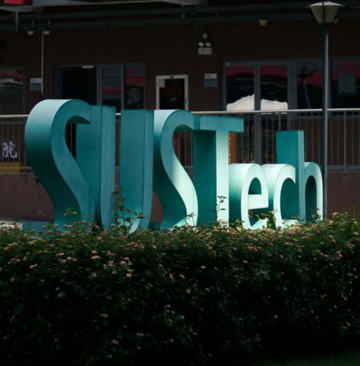SUSTech hosted the International Symposium on Antibiotic Resistance in the Environment (ISARE2017)
The 2017 International Symposium on Antimicrobial Resistance in the Environment was held at International Conference Hall of Lynn Library in Southern University of Science and Technology (SUSTech) on December 1st 2017. This symposium was co-hosted by International Center for Antibiotic Resistance in the Environment (iCARE) of SUSTech and Environmental Biotechnology Laboratory of The University of Hong Kong (HKU). The symposium attracted more than 160 experts and students in the field of environmental microbiology. The opening ceremony was chaired by Distinguished Visiting Professor of School of Environmental Science and Engineering at SUSTech, Professor Tong ZHANG (Professor at Department of Civil Engineering, The University of Hong Kong / Emeritus Professor at School of Public Health, The University of Hong Kong). Vice President Tao TANG of SUSTech and Dean of the School of Environmental Science and Engineering Prof. Chunmiao ZHENG made an opening speech.

Vice President Tao TANG of SUSTech

Dean of the School of Environmental Science and Engineering
Prof. Chunmiao ZHENG

Distinguished Visiting Professor of School of Environmental Science and Engineering at SUSTech
Professor Tong ZHANG
Experts on antimicrobial resistance (AMR) were invited to give speech on their latest work on AMR issue. These international attendances were invited from institutions including: New York University, Michigan State University, Rice University, Virginia Tech, Technical University of Denmark, University of Lyon, Macquarie University, McMaster University, Swiss Federal Institute of Aquatic Science and Technology (Eawag), Agriculture and Agri-Food Canada, Chung-Ang University, the University of Hong Kong, Hong Kong Polytechnic University, Southern University of Science and Technology, Nanjing University, Zhejiang University, Sun Yat-sen University, Nankai University, Peking University Graduate School at Shenzhen, Tsinghua University Graduate School of Shenzhen, Institute of Microbiology Chinese Academy of Sciences, Research Center of Eco-Environmental Sciences Chinese Academy of Science, South China Normal University, Institute of Urban Environment Chinese Academy of Sciences and U.S. National Science Foundation.
In the two-day symposium, a total of 25 reports were delivered focusing on antimicrobial resistance in environments and environmental distribution of antibiotic resistance genes (ARGs). The areas discussed included: ARGs treatment in pharmaceutical wastewater treatment, manure composting in agricultural soil, surface water and sediments, municipal wastewater treatment (including activated sludge / anaerobic sludge), reclaimed water and drinking water facilities. Additionally, water security issues caused by AMR was covered. International strategies for monitoring and risk assessment and control of resistance determinants, ARGs was discussed among the experts.

Invited Speakers

Professor of Translational Medicine and Microbiology at New York University School of Medicine, Professor Martin J. Blaser introduced his work on the impact of antibiotics on gut microbiota and revealed the casual relationship between early age antibiotics usage and adult obesity in mouse. His research also showed the interference caused by antibiotics in mother gut microbiota will pass on to the infant and introduce life-long impact on the baby. “We have used too much antibiotics” Prof. Blaser said, “People may refuse antibiotics prescription, if mother know the impact of antibiotics she is taking may affect her baby health in the future. To let them know is what we need really working on.”. Prof Blaser is serving as the Chair of the President's Advisory Council on Combating Antibiotic-Resistant Bacteria (CARB). His book 《Missing Microbes》is the masterpiece to raise public awareness on antimicrobial resistance. By now it has been translated into 18 languages including Chinese.

Martin J. Blaser giving a speech

Epidemiologist from the School of Public Health at The University of Hong Kong, Prof Keiji Fukuda shared with the audience the overview of global antimicrobial resistance (AMR) issue. Combining multiple aspects of scientific concerns, political and economic obstacles, he tried to paint an accurate picture of the problem. He pointed out one significant roadblocks to combatting AMR is the misuse and overuse of antibiotics. As a global issue, contributing factors are diverse. Input from multiple sectors are needed. Scientific evidences are requisite to fill in the knowledge gaps between industrial common practice and international strategies and efforts.

Keiji Fukuda giving a speech
Microbial Ecologist from Michigan State University, Prof. James Tiedje introduced his work on the absolute quantification of resistance determinants, antimicrobial resistance genes (ARGs) in soil microbiome. As the most senior participant and one of the founders of modern microbial ecology, Prof Tiedje shared life advise with young researchers in the banquet. “James is a live role model for life-long passion towards science.”, Prof. Tong Zhang, the convener of ISARE2017 said to us. “Science is not only a work, to me it’s more about love; if you love your work, you will never want to retire.”, James replied.

James Tiedje giving a speech

Q&A with James Tiedje

Group Photo
